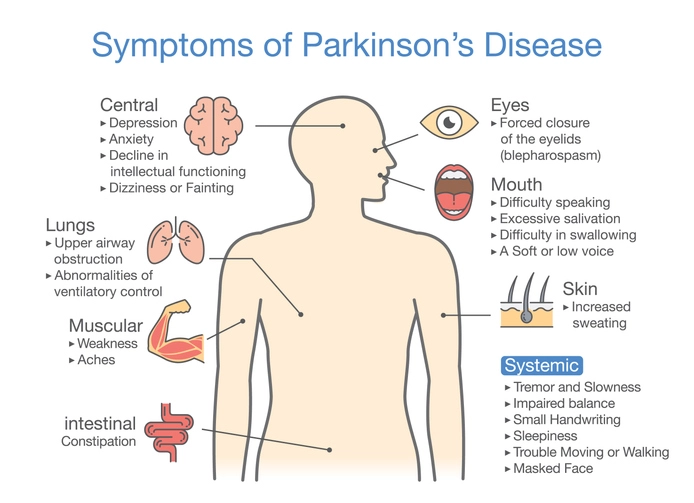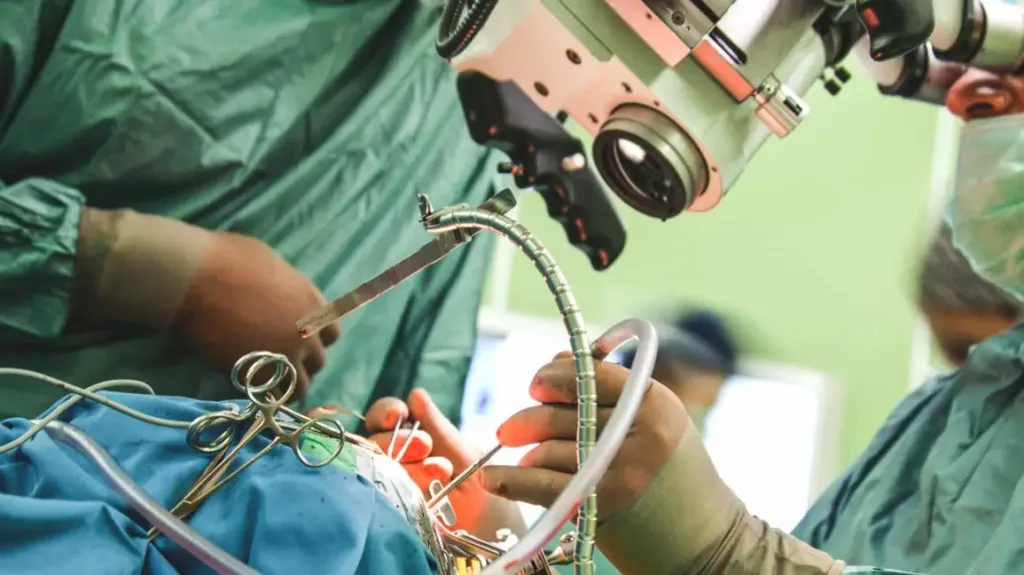Parkinson’s disease is a disease associated with the nervous system characterized by frequent and rapid tremors in the palms of the hands. In the beginning of this disease only one palm vibrates but gradually it starts affecting the other palm as well. When there is Parkinson disease, the palm is often bent and there is a tremor in the palms. In the initial stage, this disease cannot be detected quickly.
Generally, Parkinson’s disease cannot be cured completely, but the symptoms of this disease can be reduced to some extent through some medicines. Here we will tell you about the symptoms of Parkinson’s disease, causes of Parkinson’s disease, risk factors and treatment of Parkinson’s disease.
Understanding Parkinson Disease

Parkinson’s disease is a progressive neurological disorder that can also be classified as a brain disorder. It is caused by damage to nerve cells in a part of the brain. This part of the brain, called the substantia nigra, produces dopamine to control movement.
In Parkinson’s disease, the cells of the substantia nigra start dying. When this happens, dopamine levels drop. Parkinson’s symptoms start appearing when there is a decrease of 60 to 80 percent in dopamine.
Causes of Parkinson’s Disease, Symptoms and Causes, Diet and Treatment
When a person has Parkinson’s disease, some nerve cells or neurons in the brain are gradually damaged or die. When a neuron is destroyed, the levels of dopamine and norepinephrine in the brain begin to decrease. Due to which the brain starts working in an abnormal way and gives us an indication of Parkinson’s disease. Parkinson’s disease can develop for a number of reasons, including:
1. Genes Triggers Parkinson’s Disease
Genetic mutations are believed to be responsible for Parkinson’s disease. This means that if someone in your household has Parkinson’s disease, you are more likely to develop it as well. But it is not necessary that there is a genetic reason behind Parkinson’s disease in every case.
2. Environmental Triggers Parkinson’s Disease
There is also a possibility of Parkinson’s disease due to exposure to contaminated environment and toxic substances. However, few people are affected by this. Researchers have found that having Parkinson’s disease causes many changes in the patient’s brain, but it is not known what causes these changes.
Also Read About : Neurological Disorder – Symptoms, Causes, Effects & Treatment
Risk for Parkinson’s Disease.
Some common factors that contribute to an increased risk of developing Parkinson’s disease include:
• Parkinson’s disease affects people in a certain age group. Most people who are diagnosed with Parkinson’s disease are 60 years or older.
• The risk of developing Parkinson’s disease is one and a half to two times higher in men than in women.
• If someone in the family has Parkinson’s disease, then other members are also at risk of getting this disease. First there are symptoms of numbness in the hands, then a strong tremor starts in the hands.
• This disease also occurs due to head injury or coming in contact with harmful substances and pesticides, herbs present in the contaminated environment.
Signs and Symptoms of Parkinson’s Disease.
The symptoms of Parkinson’s disease can be different in different people. This disease affects men more than women. Its symptoms or initial signs are very mild or non-existent and the special thing about its symptoms is that they start on one side of the body and despite being affected on the other side, that side (from where the symptoms started) is more Keeps getting worse.

Symptoms of Parkinson’s Disease.
May include the following symptoms:
1) Tremor:
This symptom is the most common symptom of the disease, usually starting in one part of the body or often in your hands or fingers. This often happens when your hand is on rest mode.
2) Slowing Down of Speed (Bradykinesia):
As time passes due to Parkinson’s disease (Parkinson’s disease Meaning in Hindi), the speed of human functioning slows down, due to which even simple tasks seem difficult and it is difficult to finish the task. It takes time.
3) Rigidity of Muscles:
Rigidity of muscles can occur in any part of your body. Stiff muscles can be painful and limit range of motion.
What is GAD? Its Symptoms and Treatment.
4) Problems with Balance:
Parkinson’s disease may cause problems with balance and your posture may be slightly different from normal.
5) Absence of Automatic Functions:
Due to this disease, problems arise in some functions like blinking eyes, moving hands while walking, laughing etc.
6) Changes in Speech:
Your speech may change over time, during this disease there may be problems like slight hesitation in your speech, hoarseness, etc.
7) Changes in Handwriting:
In Parkinson’s disease, you may face difficulties in writing and your handwriting may also become smaller as you struggle to write.
Some other Symptoms of Parkinson’s Disease are as follows:
• Anxiety, insecurity, and stress
• Confusion
• Not remembering
• Dementia
• Constipation –
• Depression
• Difficulty swallowing
• Decreased sense of smell
• Sweating profusely
• Erectile Dysfunction (ED)
• Skin problems
• Slow, quiet speech, and monotone voice
• Increased urinary frequency
• Trouble sleeping or insomnia
• Change in blood pressure
• Fatigue
Do you know the causes of Teenage Stress?
Who Gets Parkinson’s disease?
• Age is the biggest risk factor for the occurrence and development of this disease, most of the people who are victims of this disease are 60 years of age or more.
• The probability of getting this disease in men is up to 2 times more than that of women.
• Some percentage of people can also be victims of this disease due to heredity.
• Due to head injury or any disease, a person can also become a victim of Parkinson’s disease.
• There is also a risk of getting this disease due to pesticide chemicals sprayed on fruits and vegetables.
Parkinson’s Disease can Cause Depression.
People who suffer from Parkinson’s disease are at a higher risk of going into depression. In this situation, treating depression can help reduce the symptoms of Parkinson’s disease. Apart from this, there are some emotional changes in a person suffering from Parkinson’s disease, such as sudden fear, anxiety and loss of self-confidence. Doctors reduce the symptoms of Parkinson’s disease by giving certain medicines to such patients.
How to Diagnose Parkinson’s Disease?
There is no specific test to diagnose Parkinson’s. It is diagnosed based on information from the patient’s health history, a physical and neurological examination, and a review of symptoms.

CAT scan, MRI and Dopamine Transporter (DAT) scan can also be used in its diagnostic process. Although these tests do not confirm Parkinson’s, they can provide information about other conditions, which can help a doctor diagnose Parkinson’s.
Treatment for Parkinson’s Disease?
Although there is no proper cure for Parkinson’s disease, its symptoms can be controlled with the help of some medicines and lifestyle changes. Adequate rest, regular exercise and balanced diet play an important role in reducing this disease.

The drugs used to treat Parkinson’s disease are:
• • Levodopa and Carbidopa
• • Dopamine agonists
• • Anticholinergics
Surgery for Parkinson’s Disease?
Surgery is recommended for people who do not respond to treatment for the disease after trying methods such as medications and lifestyle changes. There are two types of surgery used to treat Parkinson’s:
1. Deep Brain Stimulation
During deep brain stimulation (DBS), surgeons implant electrodes in specific parts of the brain. A generator attached to the electrodes sends out pulses to help ease symptoms.
2. Pump Delivered Therapy
The Food and Drug Administration approved a pump delivered therapy called Duopa in January 2015. In this procedure, a combination of levodopa and carbidopa is given to the patient through a pump. The doctor surgically makes a small hole in the abdomen to connect the pump to the patient’s small intestine.
What is Alzheimer’s Disease : Symptoms and Treatment.
Prevention of Parkinson’s Disease.
Till now the exact cause of Parkinson’s disease is not known. It remains a mystery to the people. But research has found that caffeine present in coffee and tea prevent the risk of Parkinson’s disease from increasing. Apart from this, green tea also helps in preventing the progression of Parkinson’s disease. Some research also claims that aerobic exercise can reduce the risk of Parkinson’s disease.
Antioxidants Diet Plan for Parkinson’s Disease.
Eating more foods high in antioxidant properties may help prevent oxidative stress and brain damage. Among the foods high in antioxidants include nuts, berries, and nightshade vegetables. Nutritious nightshade fruits and vegetables include:+
• Tomato
• Potato
• Bell Peppers
• Hot pepper
• Eggplant
• Goji berries
• Blueberries

Parkinson’s Disease Home Remedies Fava Beans.
These lime green beans or fava beans contain levodopa, the same ingredient used in some Parkinson’s drugs. Therefore, people who are suffering from Parkinson’s disease should give more emphasis on including fava beans in their diet.
Parkinson’s Diet Omega 3 Rich Foods.
Diets rich in omega-3 fatty acids, such as salmon, oysters, flaxseed and some beans, have been shown to promote heart and brain health. Omega-3 fatty acids may help reduce brain damage in patients with Parkinson’s Disease.
In addition to eating more of these beneficial foods, Parkinson’s patients are also advised to avoid consuming dairy and saturated fat.
Read Also : Why Cardiac Arrest Occur More in the Morning?
(Disclaimer: This article is for general information only. It is just to wake you up for your health purpose. Out intension is not to mislead or It cannot in any way be a substitute for any medicine or treatment. Always contact your doctor for more details.)
4 thoughts on “Parkinson Disease Treatment: Causes, Symptoms, Diagnose and Diet”